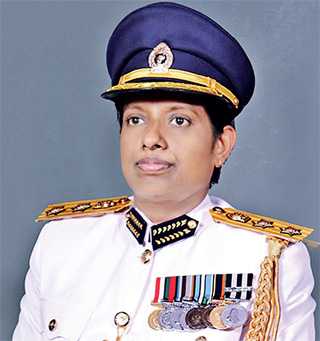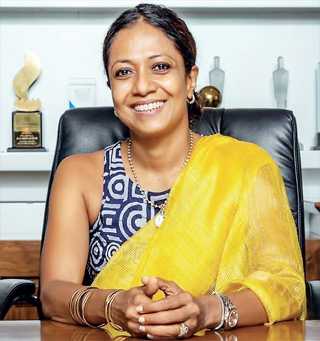Monday Feb 23, 2026
Monday Feb 23, 2026
Tuesday, 9 March 2021 01:59 - - {{hitsCtrl.values.hits}}

In 2020 alone, the country wrote a new chapter in its history with the appointment as DIG of Bimshani Jasin Arachchi

Weeks later, Kasturi Chellaraja Wilson was appointed as the first female Group CEO of a major conglomerate in Sri Lanka

The Sri Lankan-born scientist Dr. Maheshi Ramasamy pioneered and led key COVID-19 vaccine research
Sri Lanka is making progress towards an equal future with equal opportunities for women in leadership. In 2020 alone, the country wrote a new chapter in its history with the appointment of Bimshani Jasin Arachchi as the first-ever female Deputy Inspector General (DIG) in the Sri Lanka Police. Weeks later, Kasturi Chellaraja was appointed as the first female Group CEO of a major conglomerate in Sri Lanka.
Amidst such achievements, the COVID-19 pandemic also highlighted the centrality of women’s contributions in our collective response and in the journey towards recovery. The Sri Lankan-born scientist Dr. Maheshi Ramasamy, for example, pioneered and led key COVID-19 vaccine research. Similarly, many other women continue to stand at the frontlines in our response as healthcare workers, caregivers, essential workers and innovators.
In this regard, the United Nations Resident Coordinator in Sri Lanka, Hanaa Singer-Hamdy, said, “This year, International Women’s Day celebrates the tremendous efforts by women and girls around the world, and their role in shaping a more equal future and recovery from the COVID-19 pandemic.”
Key to this recovery is sustainable and inclusive development which, she added, “relies on ending discrimination towards women – we cannot deliver on the promise of ‘leaving no one behind’ in development, if half of our world is left underrepresented in places of power, excluded from decision making or marginalised and harmed.”
Contributions like those from Deputy Inspector General Jasin Arachchi, Chellaraja, Dr. Ramasamy and countless others demonstrate women’s effective leadership in many fields, including the COVID-19 response and recovery efforts. Women bring their own perspectives and abilities to the table and make irreplaceable contributions to decisions, policies and laws to build a better future.
As the pandemic deepened vulnerabilities in our food supply chains, for instance, it was evident that more women in leadership roles were needed to contribute to advance agro-technology and improve food security and nutrition education in the country. This leadership is vital to ensure response efforts address the needs of all members of society, and particularly the gendered impact of COVID-19 to reach the furthest left behind.
The future is equal—free from stigma, stereotypes and harmful gender norms
Despite the many achievements, change has been incremental and slow. Harmful gender norms, discrimination and biases in Sri Lanka continue to present obstacles for women in leadership positions. The Women’s Wellbeing Survey (2019) shows that 47.5% of women in Sri Lanka felt that men are superior to women. At present, only 5.3% – 12 out of 225 legislators – are women.
Despite early achievements of producing the first female Prime Minister in the world, the representation of women legislators at the national level has never exceeded 7% throughout Sri Lanka’s electoral history, since 1931. Discriminatory attitudes continue to prevail, and women in leadership positions are not exempt from opposition, in fact they are held to a much higher level of scrutiny. This is evident in the recent petition challenging the appointment of DIG Bimshani Jasin Arachchi.
Similarly, electoral violence remains a major deterrent for women to contest in local elections. In some instances, these inequalities are entrenched in personal laws with discriminatory clauses preventing women’s advancement politically, economically and socially.
Such discrimination based on gender is a major impediment to the achievement of gender equality. Creating an equal future requires transforming unequal power relations by challenging gender norms including engaging men and boys to speak out, support women in leadership and transform social norms and challenge gender stereotypes that perpetuate discrimination and inequality. This in turn also frees men and boys from harmful gender norms, which limits their potential.
The future is safe—free from violence against women and girls
Gender-based violence is another key factor that prevents women and girls from safely and fully participating in social and public life. Violence against women and girls is an alarming and persistent human rights violation that has long-term and severe socio-economic, physical, mental, and sexual and reproductive health impacts on victims and survivors.
Recent data from the Women’s Wellbeing Survey (2019) shows that 35.3% of women in Sri Lanka agree that men can have a good reason to hit their wife or partner, and one in five ever-partnered women in the country have experienced physical and/or sexual violence in their lifetime. Since the outbreak of COVID-19, emerging reports from those on the frontlines have also shown that violence against women and girls – particularly domestic violence – has intensified, amounting to a growing shadow pandemic amidst the COVID-19 crisis.
To achieve the 2030 Agenda for Sustainable Development, eliminating gender-based violence is a key priority. To create a future that is safe for women and girls in Sri Lanka, gender-based violence prevention and response services must be declared essential, including psychosocial support and the availability and preparedness of shelters for survivors.
To prepare for an equal future in a COVID-19 world, in which women are protected from and empowered against gender-based violence, and social, economic and political inequality, women must be actively involved at all levels of decision-making.
Women’s representation can only be meaningful when it presents a reflection of all women and girls, in all their diversity – including those identifying as women and girls – and across all cultural, social, economic and political situations. As such, Governments and policymakers need to ensure that all women – across different backgrounds and experiences – have equal access to leadership and decision-making roles, and that none of the voices, interests and needs of women are excluded.
In this Decade of Action, it is more vital than ever to work together to ensure Sri Lanka’s progress towards achieving gender equality, and to continue to work towards breaking through the ‘glass ceiling’. This International Women’s Day, as we celebrate women in leadership to achieve an equal future in a COVID-19 world, the UN in Sri Lanka reinforces its commitment to promote and advocate for women in leadership, to build a Sri Lanka where every woman’s agency is acknowledged and assured to achieving a future that is equal for all.